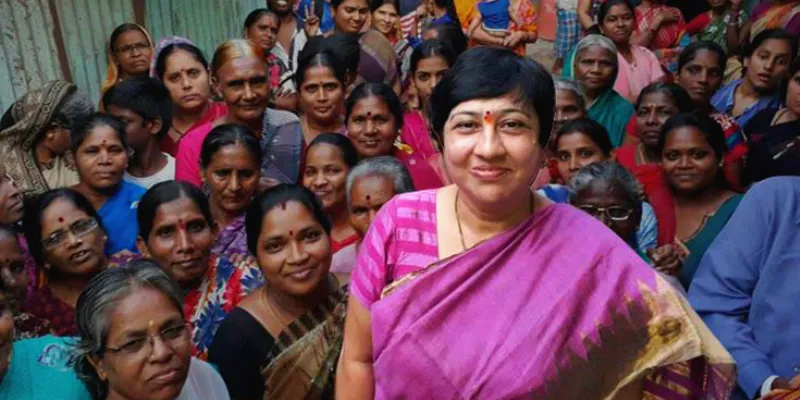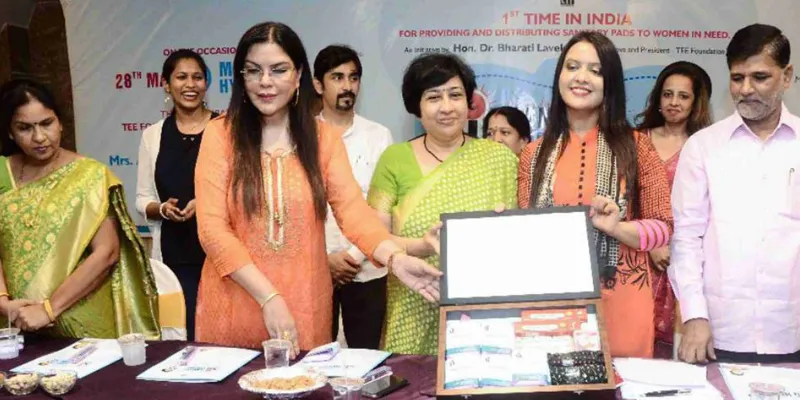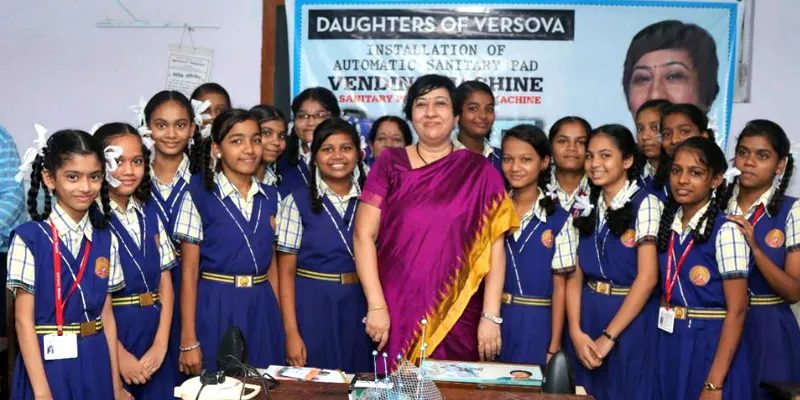Meet the politician who’s talking about menstruation openly and has set up India’s first Digital Sanitary Pad Bank
More activism, less politicking. Dr Bharati Lavekar’s NGO has distributed two lakh sanitary pads so far, installed vending machines in 5 schools and aims to set up machines in public toilets.
While activists and politicians are both technically working to bring change at the policy level and are two sides of the same coin, the current status quo often compels them to be on the opposite sides of a tourney instead. But Dr. Bharati Lavekar, the incumbent MLA representing Mumbai’s Versova constituency, is one of those policymakers staying true to her original intent and “fighting the good fight” by amalgamating her politics and activism into an all-powerful way of life.
Bharati has made it her life's mission to fight for the rights of women and children. And with her election to Maharashtra’s Legislative Assembly, she is making sure her roars reverberate farther and wider.

A lifetime of service
Born and raised in Marathwada, Bharati finished her Bachelor of Journalism from Marathwada University, procured an MA in Political Science, and even did a PhD in uniform civil code.
She entered politics almost 25 years ago, but her spirit has always been that of an activist. That’s why she’s dedicated to women and child rights, which also forms the core focus area of her NGO, Tee Foundation.
When the 2011 census brought to light that Shirur Kasar taluka in Beed district of Maharashtra, consisting of 120 villages, had the worst sex ratio - 669 girls to every 1,000 boys - Bharati was at the forefront to bring them out of the red zone.
“My NGO adopted that taluka for three years, staring August 15, 2011. It took a lot of hard work, but we started a scheme under which we would start a fixed deposit worth Rs 5,000 in the name of any girl child being born after August 15, 2011,” she recalls.
This ambitious scheme did wonders, and circumstances started turning around. Eventually, the ratio was brought to 921 girls for every 1,000 boys.
When intent meets action, and action meets legislation
Bharati’s political career began with the Nationalist Congress Party, but she joined the Shiv Sangram party ahead of the 2014 race. She was subsequently elected to the Vidhan Sabha as part of the BJP-led NDA.
After assuming office, women’s rights found a place on her manifesto as well. “They make up 50 percent of our population. Their problems are grave and cannot be ignored,” she says.
READ ALSO: Sindoor or sanitary napkin–what does GST Council view as more indispensable to women?
In the course of her work, the problems arising out of the taboos surrounding menstruation are something she ended up researching a lot. Some very disturbing statistics came to the fore – in India, only 15 percent women get access to pads. They either cannot afford them, or lack awareness. As many as 70 percent women think menstrual blood is dirty. 66 percent girls and women manage periods without toilets. Over 85 percent of women who menstruate use unsafe materials, resort to shocking alternatives like unsanitised cloth, ashes and husk, sand and leaves. And over 23 percent girls drop out of school completely after reaching puberty.
“Many are left to manage their periods in an unsafe manner using old rags, leaves and other unhygienic and ineffective materials. This results in diseases, sometimes even cervical cancer. It is important to note that India accounts for 27 percent of the world's cervical cancer deaths. But around 70 percent of women in India say their family can't afford to buy sanitary pads,” she says.
Bharati’s solution was quick, simple and in line with the national digital agenda – a Digital Sanitary Pad Bank, which was launched on May 28, 2017, and inaugurated by Maharashtra’s first lady Amruta Fadnavis and Zeenat Aman.
“The expenditure for one girl’s monthly pad needs is Rs 70, for about 10 pads. So, you can either donate the pads directly or the amount needed to buy them, for one month, multiple months, a year or multiple years, based on how much you are willing to contribute. The bank is a mediator between donors and beneficiaries, and we at Tee directly funnel the pads to them,” she says.

One can either donate the amount through a bank transfer, Paytm the amount or post the pads directly to the address on the website. Every woman with an Orange ration card is entitled to the pads and funds collected through the digital sanitary pad bank.
Bharati also urges citizens from tribal areas and schools to approach her if they are in need, and get associated with the initiative. She has distributed 2 lakh pads so far.
Prominent celebrities like Anushka Sharma also joined hands with her for a short film on social media, emphasising the need for appropriate menstrual hygiene.
Fighting the good fight
Her work fighting the evils of improper menstrual practices far from ends here. At the policy level in the Vidhan Sabha, she has dedicated money from the MLA fund towards installing sanitary pad vending machines at schools and in public toilets.
So far in her constituency, five schools have already been taken under the wings of her 'Daughters of Versova' initiative that promotes menstrual hygiene and making sanitary pads available to the underprivileged, and been granted an automatic sanitary pad vending machine, disposal machine and a menstrual health kit, containing painkillers, fresh underwear, and literature on how to care for oneself during menstruation as well as how the perceptions of both men and women towards menstruation need changing.
“Many schools that may even have funding don’t choose to direct funds to these amenities so I am pushing for this at my level,” she says.
Under another initiative, called Doctors of Versova, Bharati set up medical camps with gynecologists because women often do not seek specialised medical help for problems relating to their reproductive system.
She’s also ensuring that people celebrate the birth of a girl child. Every time a girl is born in her constituency, Bharati personally visits the family at their house or invites them over to her office to congratulate them and hand over a small present.

With Sudhir Mungantiwar, Maharashtra’s current finance minister backing her, Bharati says setting up pad vending machines at public toilets is also on her agenda.
“If you are stranded in the middle of the night and have no chemist in sight, a public toilet should be equipped with a vending machine to help you through that situation. This awareness needs to reach the lowest common denominator,” she says.
Last but not the least, she is also a staunch advocate of period leave. “Women undergo immense pain during their period, and students as well as professionals lie about maybe having fever or stomach ache when they want to take the day off due to period pain. I want people to start talking about this openly. I ask schools during my speeches to let girls cite menstrual discomfort as their reason for missing school openly, and I am urging the authorities to see it as a legitimate reason,” she says.
The main reason why an issue as grave as this has been pushed under the rug for centuries is because people everywhere, including women, shy away from discussing it.
“Even my party workers previously felt awkward and outraged that I spoke about menstruation openly, but they slowly came around and now they themselves are perfectly comfortable giving lectures on the subject!” she says. “I don’t know how many MLAs will further replicate this model, but it is the need of the hour,” Bharati adds.







